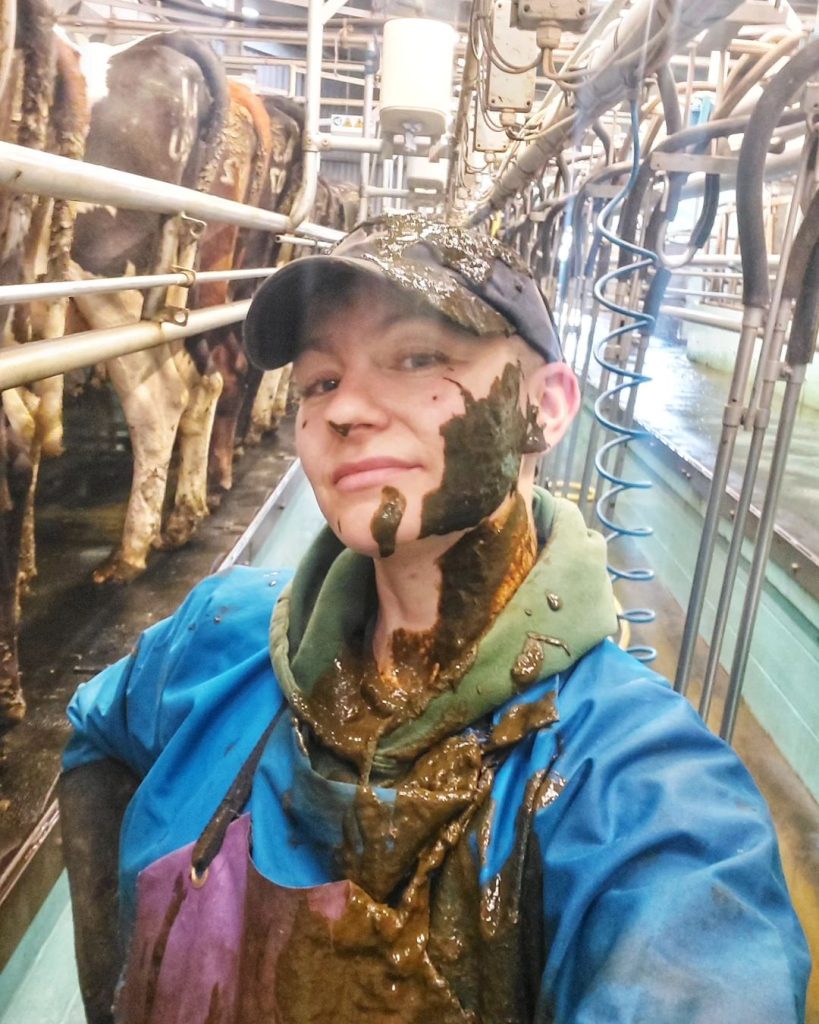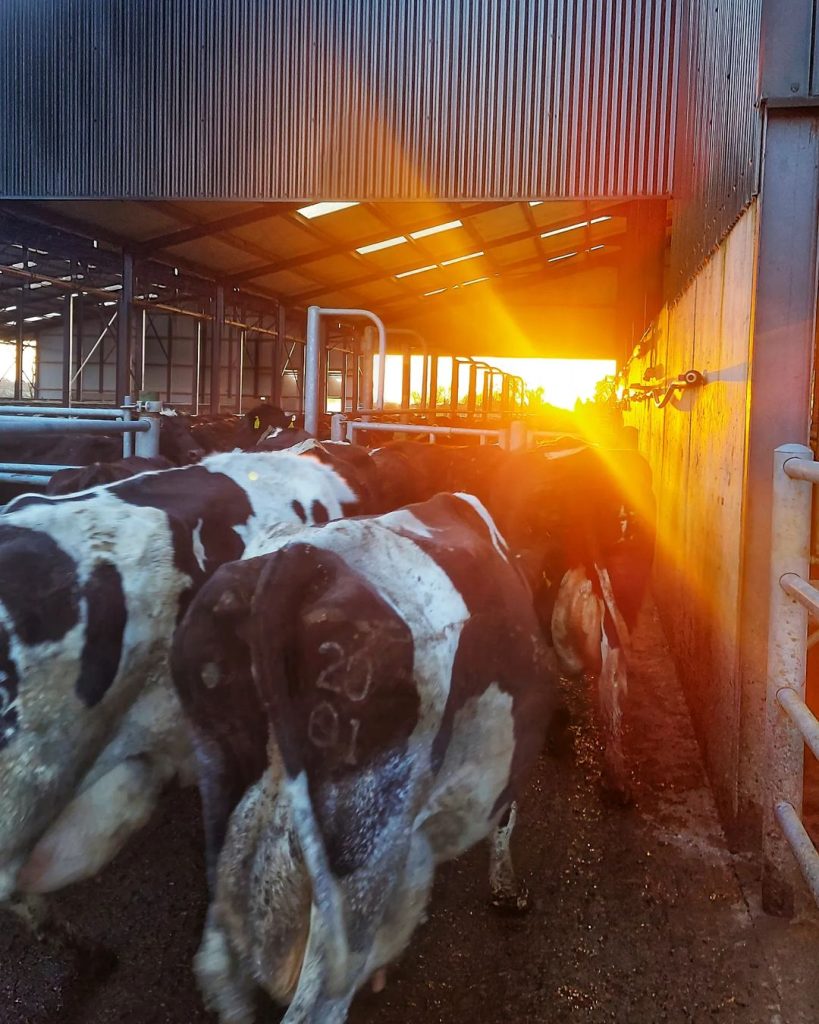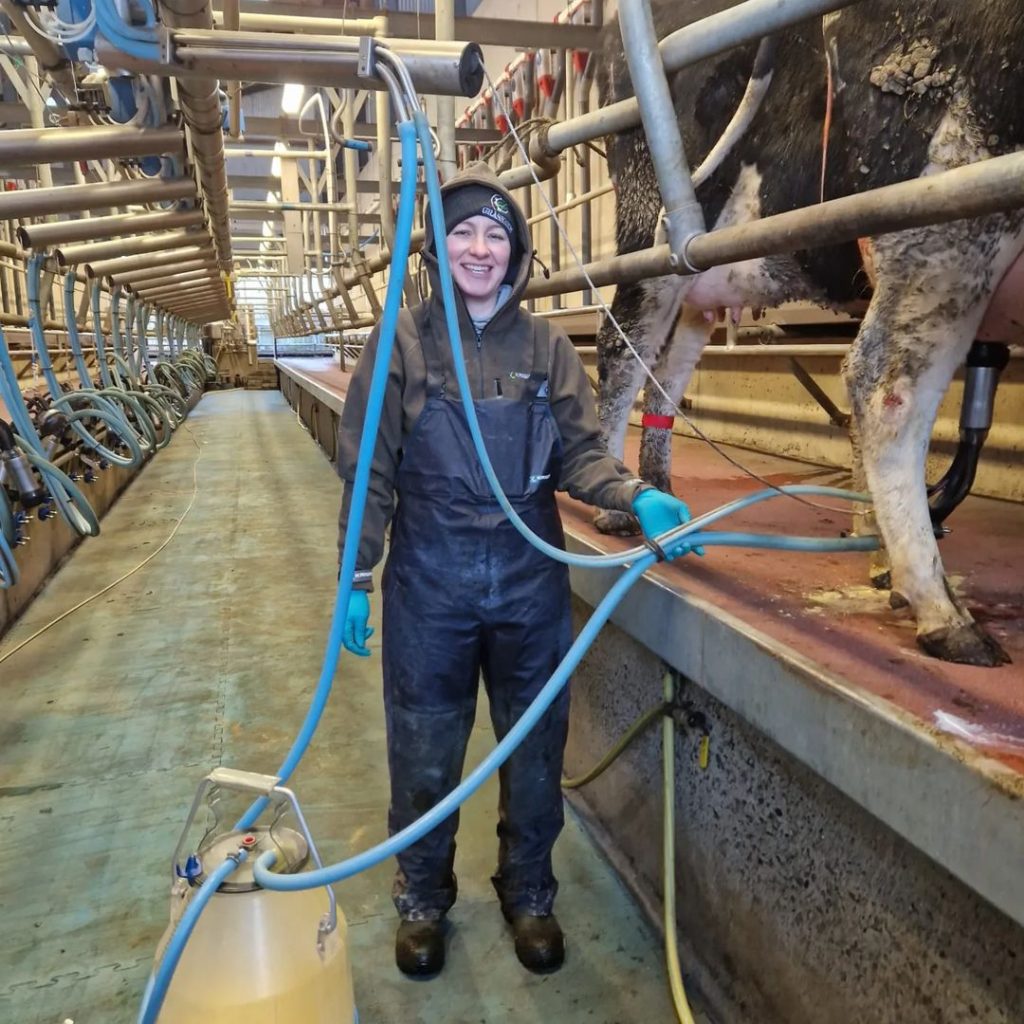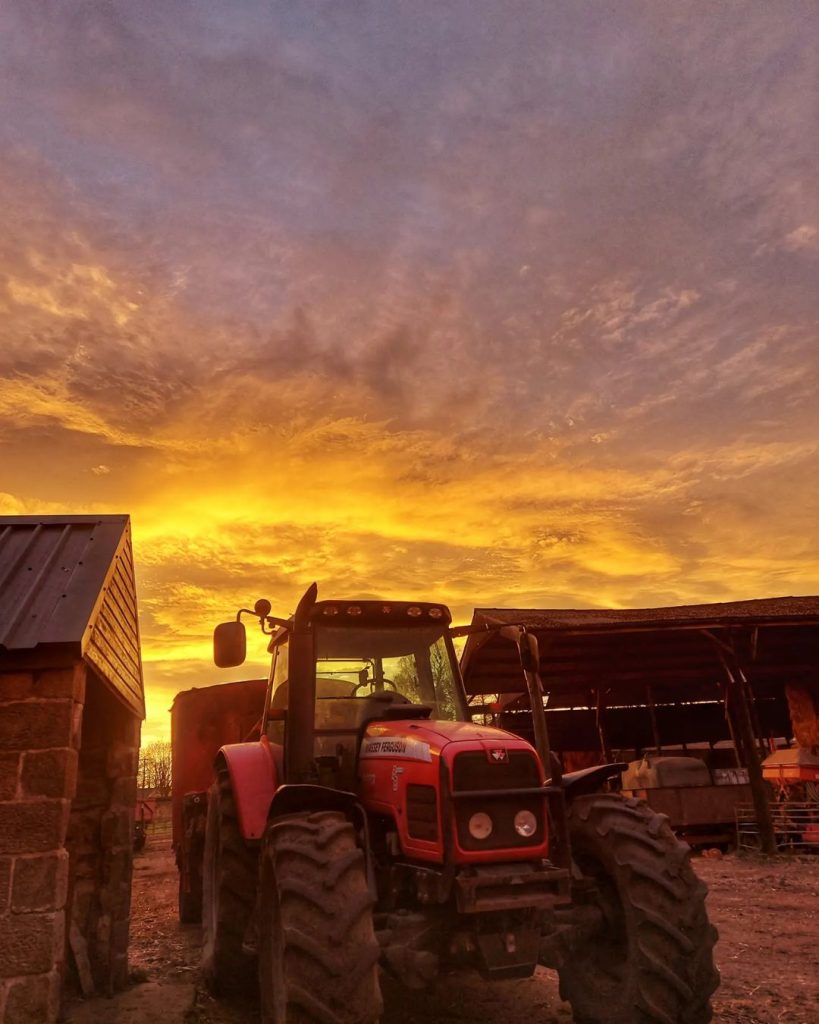Lorna Roberts – A Walk in their Wellies blog

As part of our campaign to support British farming, we created this blog to provide farmers with a platform to share their stories and experiences, offering insights beyond what you see on their Instagram accounts. Read below to take a walk in Lorna Robert’s (@the_dairy_lass) wellies, a first generation dairy farmer from Sheffield…
Hi there I’m Lorna
I’m a born and bred Sheffield lass so in other words a towny who turned to farming.
I’m currently on a spring block calving milking herd in Ireland specifically here to cover the busy calving period. In the UK for the last 3 years, I worked as a relief milker on a few farms in Derbyshire. One of my many roles over the last decade.
1. Please give us a brief of your farming background and what led you to become a farmer.
I’ve always had a love of animals be it pets at home dogs, cats, chickens, and a dream to one day have a horse. So, an animal related job was definitely written in my future. At age 15 at school, we are sent on a 2-week work based placement, as a towny who loves animals your expected to work as a vet nurse or with the RSPCA. Luckily for me I was placed on a city farm not far from home. There I started my love for large farm livestock. With teaching and guidance from the farm boss who encouraged me to go to full time college and university. After uni I worked for a few years as a shepherdess before changing to work with dairy cows after calving down 300 dairy cows in Tasmania. I would’ve loved to be a vet, but I didn’t get the grades but I’m pretty happy farming.
2. What are the key qualities needed to do your job?
Patience, passion, a big love of animals, early mornings, a good sense of humour and keen to do manual labour.
3. How did you train for and become competent at this role?
A few years at Bishop Burton and then Harper Adams University taught me an all-round knowledge of farming, but the majority of my dairy training was done on the job. You can only learn so much in a classroom, but never stop learning and progressing.

4. How do you manage stress and maintain mental well-being as a farmer, and what coping strategies have you found to be effective?
A good relationship with your boss/employers is essential if there’s anything stress work related it’s good to be able to just talk it over. Pilates is fabulous for keeping the body working well so I am fit for working as our manual job can put a lot of strain on the body.
Hiking, meditation, and my allotment are my happy places. There’s nothing quite like growing your own food.
5. What impact do seasons, and weather patterns have on your daily life and work as a farmer, and how do you prepare for and adapt to changing conditions?
We’re a slave to the weather and without the changing of the seasons we wouldn’t be able to farm. Ensuring the cows are happy is the number one priority. Planning ahead making sure they are always well fed. Droughts are the biggest worry as your cows are grazing away in summer grass is the best feed for milkers. Trying to grow enough silage for winter feed while keeping grass ahead of the cows. Measuring weekly grass growth producing a grass budget is essential in predicting how much feed and for how long, buying in feed if needed.

6. What is your typical daily routine as a farmer, and what tasks do you have to perform on a regular basis?
Back home when relief milking the routine would start by driving 20 to 25 minutes to work, depending on which farm that could be at 4.30am or 6am. Bringing the cows in on a quad bike if they are out at grass or fetching them out of the sheds if they are in for winter, milking, wash down routine followed by putting the cows out to graze or back in their clean shed. To do it all again in the evening time.
Here in Ireland I start at 6am first thing I do is check the calving pens, assist any cows or heifers that need it. Any calves on the ground are tagged, navel sprayed and put in a calf group pen. The calved cow is given a warm recovery drink. The cows are then milked, any colostrum is collected and put into a clean well labelled bucket for the calf rearer. The dry cow cubicles are scraped clean then limed and the girls are given their breakfast. In between checking calving cows throughout the day I’ll be cleaning equipment, making up calf pens, clipping cow tails. Before we know it the afternoon milking time comes around quickly. The cows are milked, the parlour washed down, the milkers are put back into the cubicle shed for the night. We check the calving cows once again before home time. Overnight the calvers are checked by the boss via a camera which can be done anywhere.

7. What’s great about being a farmer?
The best thing about being a farmer is working outside in the fresh air no matter the weather. We get to see many sunrises and sunsets that most folks don’t. Witnessing the birth of new life which never gets boring no matter how times you see it and then being able to watch that calf grow to fine heifer. I love the physical work it keeps me fit and I go home each day feeling accomplished.
8. What do you think are the challenges?
From a farmers personal perspective, we are rubbish at looking after ourselves. We need to balance life better, so we have time with friends, family and for ourselves. Days off for rest and relaxation are essential and not a sign of a lazy farmer.
The general public’s opinion of farming needs improving. That’s one of the best things about social media it can reach a wider audience to show the day-to-day goings on for real farmers, that we are an industry worth supporting.
9. Have you always felt supported when learning and on the job?
I’ve worked for a few employers who were not interested in teaching while working but I had the confidence to leave and find better bosses.

10. What advice would you give to someone who is interested in becoming a farmer, and what skills do you think are essential for success in this field?
If you’re wanting to have a crack at farming go for it. It’s not going to be all fame and riches but is rewarding in other ways. Be prepared to approach farmers to ask for free work to build up your experience. Go to as many different farms as possible to see which role or direction suits you and makes you happy.
Being a good timekeeper, observation skills are essential but can be taught, being a cool calm person around livestock.
11. What job opportunities are available for somebody, man, or woman, wanting to enter the trade?
Farming is full of varied careers so even if someone is not wanting to work full time looking after livestock there’s an area that you could excel in. Vet tech, hoof trimming, shearing, ai technician, feed consultant just to name a few.
If you’re a farmer and you’d like to contribute in our campaign to raise awareness for the incredible work in British agriculture, please drop us a DM on Instagram – @_howdenrural







